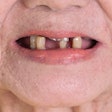
SAN FRANCISCO - Does Alzheimer's disease have an effect on a patient's oral health?
Yes, and the severity of dementia may well be related to the extent of a patient's oral health issues, according to researchers who presented at this week's International Association of Gerontology and Geriatrics (IAGG) 2017 World Congress. Additionally, these patients may be at an increased risk for oral diseases, which could lead to an increase in morbidity and a lower quality of life.
Any barriers to these patients accessing dental care need to be addressed, the researchers stressed.
"Barriers (e.g., financial) to accessing dental care by vulnerable groups such as the elderly living with dementia need to be removed," they wrote in their poster presentation.
The study was led by Gauri Mathur of Poznan University of Medical Sciences in Poznan, Poland. Colleagues from the University of Toronto and York University, both in Toronto, Canada, also contributed.
Attention to the issue
There has not been much attention focused on what implications exist for poor oral health in patients with cognitive impairments, such as Alzheimer's disease. Often, oral health is not prioritized by healthcare professionals and caregivers of patients with these impairments, the researchers noted.
They wanted to discover if an association exists between cognitive impairment and poorer oral health, and they examined six databases and manually reviewed more than 6,000 articles, eventually including 110 for final analysis.
After reviewing these studies, the researchers listed five key findings:
- The severity of dementia may be related to the extent of a patient's oral health issues.
- Patients who attend memory clinics and other forms of therapy may have better oral health.
- Patients who were women generally had better oral hygiene practices than men in the studies. The authors concluded this means better oral health for patients who are women and should be noted when treating these patients.
- Poor nutrition comes from poor dentition associated with cognitive impairment.
- Patients with the fewest teeth had the highest risk of prevalence and incidence of dementia.
Addressing barriers
More research needs to be done that compares the oral health between patients with Alzheimer's disease living at home and those living in an institution, according to the study authors.
In addition, all healthcare professionals, not just oral healthcare practitioners, should be aware when treating these patients, they noted. Any barriers to these patients accessing dental care need to be addressed, especially financial issues, they added.
"Special care should be taken by all healthcare professionals when assessing and treating Alzheimer's disease patients," especially male patients, they concluded.



















